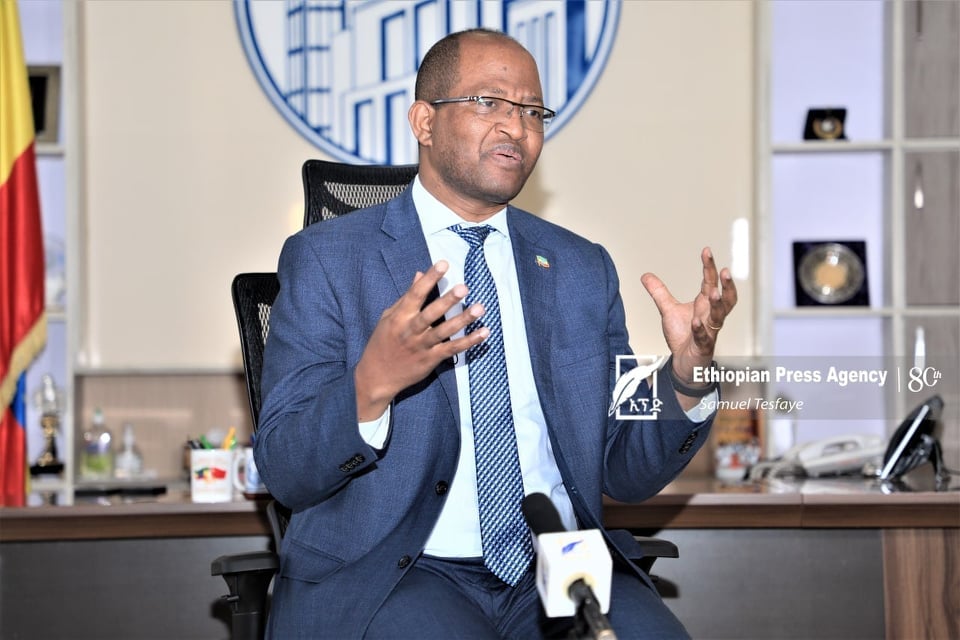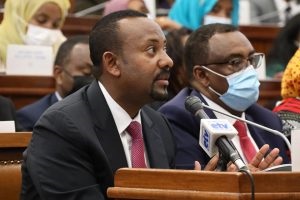
BY ABDUREZAK MOHAMMED
Tagesse Chaffo, former Public Service and Human Resource Development Minister, is speaker of House of Peoples’ Representatives. Lately, He had a short stay with The Ethiopian Herald to discuss on the current affairs of the country and wide range of activities of the House.
Excerpts:
Various reforms are put in place and guidelines are being prepared to help the House hit the set target and discharge constitutional responsibilities as effectively and scientifically as possible. How can these reforms be exhibited and what are the outcomes?
According to article 50 of the Constitution of the Federal Democratic Republic of Ethiopia (FDRE), the highest power in the country is in the hands of the House of Peoples’ Representatives. It has four main constitutional mandates: making laws, supervising executive body, representing the electorate, and conducting parliament diplomacy.
The general laws governing the country are issued by this House, too. Following the national reform, repressive laws like anti-terrorism law, civil societies’ organizations proclamation, mass media law and other various laws have been amended.
Various works have also been undertaken to keep activities strong and organized by reorganizing the ten standing committees and thirty three sub-standing committees of the House of Peoples’ Representatives.
Various researches were conducted regarding our activities of representing the electorates in collaboration with Addis Ababa University. We have come to the conclusion that we need to find more ways to reach out to the public and respond to their requests. In this regard, Rules of Procedures and Members Code of Conduct of the House are being revised and they will be approved soon.
Efforts have been made to assess the overall activities of the House and to single out the shortcomings. By involving experts and stakeholder, manuals have been prepared to improve the activities of the House like making laws, supervising the executive body, representing the electorates, and fostering parliament diplomacy.
Particularly, the manual that has been prepared in relation to our legislative system has a great value to make the future laws go hand in hand with the previous laws, Constitution of the country, and the international law, conventions and treaties signed by Ethiopia.
The manual will also play a key role in ensuring public participation in our legislative process. If laws are designed with the above in mind, their role in the development of the country will be significant.
Encouraging and promising works are also being done to establish an effective monitoring system that ensures transparency and accountability among the executive body inviting scholars and involving a number of stakeholders.
The Office of House of Peoples’ Representatives has been reorganized and the Parliamentary Research Network (PRN) has been set up to ensure that all the activities of the House are supported by research in collaboration with universities and other stakeholders.
Previously, when democracy was at stake and projects were extremely delayed including the Grand Ethiopian Renaissance Dam (GERD), the Parliament was said to be passive. But, after the reform, the MPs seem to be vibrant. Where does the difference come from?
Before the national reform, there were widespread public demands, project delays, lack of good governance, waste of resources, and looting. The House had to work to solve these problems. As the name implies, House of Peoples’ Representatives is a group of individuals who represent the people. Before the national reform, MPs wanted to hear the demands of the people and asked the executive to solve them. But, contrary to the Constitution, they were under the influence of the executive body.
However, following the national reform, the provisions of the constitution relating to the powers and duties of the MPs have been implemented properly. Now, MPs are evaluating the executive bodies. This good beginning should be continued and strengthened in future.
It is only the power of the MPs to discuss and decide on agendas that are presented to the House. But, this did not happen in practice before the national reform. When standing committees evaluated other institutions or executives, they received various threats and intimidation; reports were erased or obscured; and officials of the standing committees were removed from office. Such corrupt practices have led to national reform. As the constitution stipulates, if any executive body fails to fulfill its responsibilities, they must be removed from office or appropriate measure should be taken.
How is Ethiopia’s participation in international, continental and regional parliamentary forums described? What has been done so far to make the truth known to the international community, especially in light of the problems our country is facing at home and abroad regarding the current situation of Tigray State, GERD, and the incursion of Sudanese army into Ethiopian border? What is planned in the future?
We have tried to make the truth about the law enforcement operation, GERD, and Ethio-Sudan border dispute known to the international community by actively participating in various international, continental, and regional parliamentary forums and by providing the international community with real information about the situation.
We have written to the European Parliament about the importance of the federal government’s law enforcement operation against the Tigray People’s Liberation Front (TPLF). The TPLF had been committing a number of unconstitutional acts over the past three years, but the federal government has made great efforts to resolve the issue peacefully. However, law enforcement action is now needed as the TPLF’s recent actions were a serious crime of treason.
Some international groups are working day and night and disseminating fabricated news deliberately about Ethiopia to thwart the overall development journey that is taking place in the country. If Ethiopia had no hope of moving forward, international organizations would not have worked to tarnish its image with fabricated news. Numerous international parties have various interests on Ethiopia.
Just as there are those who want to work with Ethiopia, there are those who do not want to see Ethiopia’s development. Currently, groups that do not want Ethiopia’s progress are circulating distorted information in connection with federal government’s law enforcement operation in Tigray regional state and the current situation of the region.
Not only are a number of activities being undertaken regarding the current situation of Tigray, but a lot of work has been done to inform the international community about the reality on the ground and the unwavering stance of Ethiopia in connection with the incursion of Sudanese troops into Ethiopian border and the construction of the Great Ethiopian Renaissance Dam (GERD).
Ethiopia has been working hard to stabilize Sudan at a time of its being politically instable. Ethiopia played its part in the formation of a transitional government in Sudan. However, the Sudanese troops invade Ethiopian border when Ethiopia was in the process of law enforcement operation.
Regarding the construction of the GERD, we have said in various forums that Ethiopia has no intention of harming anyone. Seventy percent of Ethiopians are living without electricity. Most of the source of the Abbay (Nile) River is in Ethiopia. So, Ethiopia has every right to use the Abbay River.
In parliamentary democracy, it seems important to welcome the incoming MPs and bid farewell to the outgoing ones given the 6th general election conducted as per the schedule. What are the procedures and your preparation?
In countries where democracy is developed, parliamentarians who complete their terms are honored. In our country, this kind of practice is briefly stipulated in the Rules of Procedures and Members’ Code of Conduct of the House. The regulation also stipulates that members of the outgoing House can engage in the field of their choice.
In this regard, we held discussion at the House level and works are being done. Document preparation task force has also been established to enable the incoming members of the House of Peoples’ Representatives to be informed and to have the necessary resources to carry out their constitutional mandates effectively.
What is your recommendation to the incoming House of Peoples’ Representatives which is due to be established following the 6th national election?
I want to see a House that can make quality laws drawing important lessons from the previous laws, and enacts laws that potentially ensure public participation. I want it to be a parliament that fulfills its constitutional responsibilities properly and supervises the executive body. Besides, I want the House to be genuine representatives of all Ethiopians.
Thank you very much for your willingness to respond to our questions!
It is my pleasure!
The Ethiopian Herald March 14/2021


